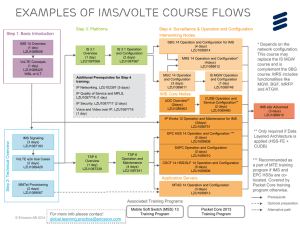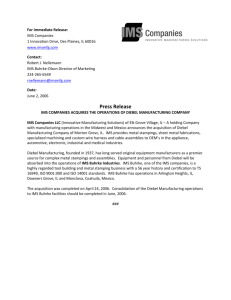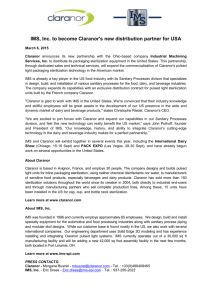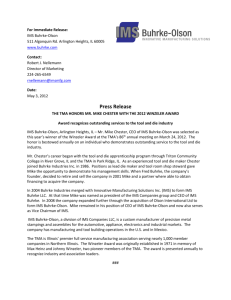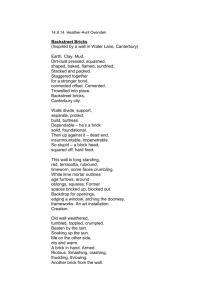DOC - Europa
advertisement
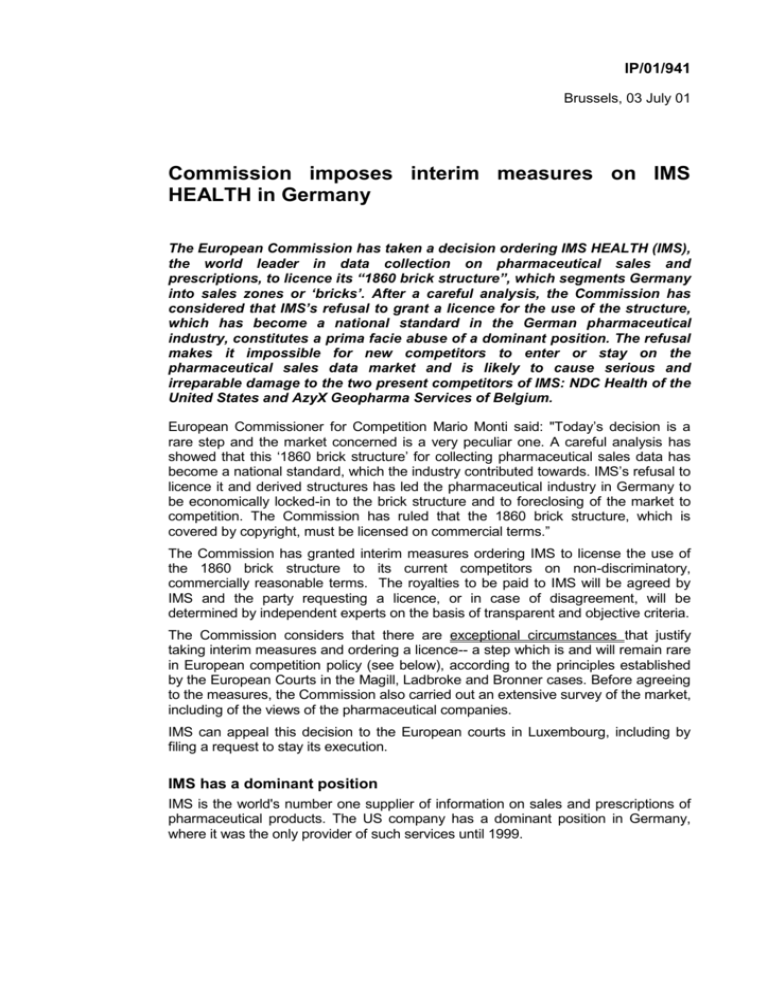
IP/01/941 Brussels, 03 July 01 Commission imposes interim measures on IMS HEALTH in Germany The European Commission has taken a decision ordering IMS HEALTH (IMS), the world leader in data collection on pharmaceutical sales and prescriptions, to licence its “1860 brick structure”, which segments Germany into sales zones or ‘bricks’. After a careful analysis, the Commission has considered that IMS’s refusal to grant a licence for the use of the structure, which has become a national standard in the German pharmaceutical industry, constitutes a prima facie abuse of a dominant position. The refusal makes it impossible for new competitors to enter or stay on the pharmaceutical sales data market and is likely to cause serious and irreparable damage to the two present competitors of IMS: NDC Health of the United States and AzyX Geopharma Services of Belgium. European Commissioner for Competition Mario Monti said: "Today’s decision is a rare step and the market concerned is a very peculiar one. A careful analysis has showed that this ‘1860 brick structure’ for collecting pharmaceutical sales data has become a national standard, which the industry contributed towards. IMS’s refusal to licence it and derived structures has led the pharmaceutical industry in Germany to be economically locked-in to the brick structure and to foreclosing of the market to competition. The Commission has ruled that the 1860 brick structure, which is covered by copyright, must be licensed on commercial terms.” The Commission has granted interim measures ordering IMS to license the use of the 1860 brick structure to its current competitors on non-discriminatory, commercially reasonable terms. The royalties to be paid to IMS will be agreed by IMS and the party requesting a licence, or in case of disagreement, will be determined by independent experts on the basis of transparent and objective criteria. The Commission considers that there are exceptional circumstances that justify taking interim measures and ordering a licence-- a step which is and will remain rare in European competition policy (see below), according to the principles established by the European Courts in the Magill, Ladbroke and Bronner cases. Before agreeing to the measures, the Commission also carried out an extensive survey of the market, including of the views of the pharmaceutical companies. IMS can appeal this decision to the European courts in Luxembourg, including by filing a request to stay its execution. IMS has a dominant position IMS is the world's number one supplier of information on sales and prescriptions of pharmaceutical products. The US company has a dominant position in Germany, where it was the only provider of such services until 1999. NDC Germany and AzyX Geopharma, the subsidiaries of respectively an American and a Belgian firm, initially attempted to sell their regional sales data in a structure other than the “1860 brick structure”. However, discussions with potential customers showed that data presented in another structure was not marketable, because of the pre-eminent position of the 1860 structure within the industry. The 1860 brick structure is a segmentation of Germany into 1,860 geographical areas, known as bricks. Each brick contains at least 4 pharmacies – German data protection law prohibits the provision of sales information for individual pharmacies. Regional sales reports are an essential tool for the pharmaceutical industry which uses them to create sales territories, develop incentive schemes for their sales force and to know about their products’ market shares and trends in sales over time. In 2000, IMS filed a lawsuit in the Frankfurt District Court against the two new competitors, alleging that they had infringed IMS’ copyright for the 1860 brick structure. The Frankfurt Court subsequently prohibited NDC and AzyX from using the 1860 brick structure or any structure derived from it. Following this ruling, NDC and AzyX both asked IMS for a licence to use the 1860 brick structure, which was refused. NDC complained to the Commission in December 2000, alleging that the refusal was an abuse of a dominant position and asked the Commission to grant interim measures. Pharmaceutical industry itself contributed to devising brick structure The Commission’s investigation looked at whether there was a real and practical possibility for firms to use another structure which would not infringe IMS’ copyright. Inquiries made to around 110 German pharmaceutical companies showed that the sector was very strongly economically dependent on the 1860 structure and that it would not be viable for them to switch to data provided in another structure. This is partly because the pharmaceutical industry itself contributed to devising the 1860 brick structure so that it would meet its particular requirements. The Commission also concluded that IMS’s rivals were unlikely to come up with and sell an alternative structure without infringing IMS’ copyright. The Commission considers, therefore, that: a) the 1860 structure is indispensable for NDC and AzyX to carry on their business, inasmuch as there is no actual or potential substitute for it, b) IMS’s refusal to licence cannot be justified objectively and is likely to foreclose the market to potential new entrants and eliminate all prospect of competition in Germany. According to the jurisprudence of the European Courts, the Commission’s conclusion is that, in the exceptional circumstances of this case, IMS’s refusal to licence the 1860 brick structure is a prima facie abuse of a dominant position contrary to Article 82 of the Treaty. The Commission also concluded that the risk of serious and irreparable harm for NDC, which filed a formal complaint, established the need to grant interim measures. Without a licence to the 1860 brick structure both NDC’s and AzyX’s German operations are in very precarious financial position and there is a serious risk that they would withdraw from the market in the near future, the result of which would be that all competition on the market would be eliminated. The granting of interim measures is not the final decision on a suspected violation of European Union competition rules which has yet to be taken. This is the first case of interim measures since 1995, a power which has been given to the Commission by the Court of Justice. In 1995, the Commission ordered the operator of the French port of Roscoff, in Brittany, to grant access to its facilities to Irish Continental Group, a ferry operator. 2 Refusal to licence an intellectual property right is not considered in normal circumstances to be an abuse of Article 82, since owners of intellectual property rights have the right to decide how best to exploit these rights. The Court of Justice found in the Magill judgement (1995) that the refusal to grant access to copyrighted information about TV programme timings was an abuse, given that this information was an indispensable input to allow a firm to compete in the market for TV listings magazines. 3
